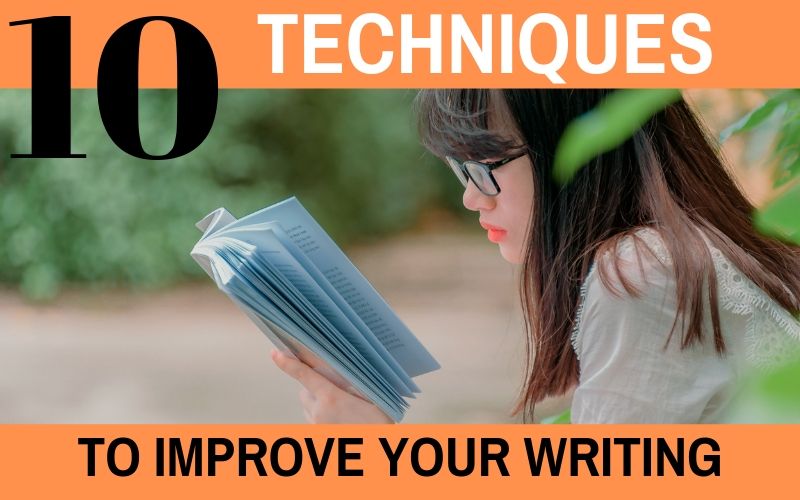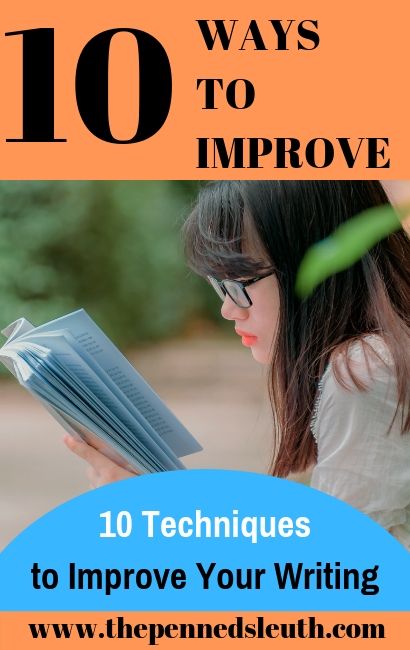Latest Writing Video! |
|
Your book has an interesting plot and you’re writing plenty in your process. However, you have that feeling at the back of your mind that the book can be improved. Changes could be made in order to make it stand out, to make the writing really stick in the reader's mind. How does one improve one’s writing? Here are ten techniques that will do just that! 1. AllusionA popular technique in writing is alluding to something. Similar to comparing something with something else, an allusion makes reference to something in order to make the concept clearer for the reader. It is a wonderful way to explain anything and certainly adds to your writing. It is certainly an excellent literary device to begin with, so be sure to keep it in mind if you want a statement to have more punch. Allusions are often used in modern writing in order to make reference to more notable places, events and people to get the reader's attention. While an allusion can make writing more lively, it certainly is a literary device that should be used in moderation as not many people make use of allusions in dialogue. Example: “He is a greedy, low-down businessman, a real wolf-of-wall street!” 2. AlliterationAn alliteration is the repeated use of the first letter in a sentence with two or more words immediately succeeding each other. A basic device you have no doubt used and studied in the past, but it is also a literary device that is appreciated in writing. The alliteration has been used in many ways to improve writing. Even popular novels make use of alliteration in the title to make the book more memorable. Gone Girl, Two Towers and such will certainly stick in the mind more than ‘The Girl Who Isn’t There’ and ‘That Tower and Another One’. Example: “Alliteration gives writing a more Free-Flowing Form, Structures Stupendous Sentences and helps Introduce Immensely Interesting Ideas!” 3. EuphemismAh, euphemisms. A wonderful way to soften the societal-blow when discussing something that isn’t pleasant to discuss. As such, euphemisms are used in order to make a conversation more tame. It is ludicrous to think that something should be discussed with such mild-censorship, but frankly, it is the way we have all become accustomed to discussing such matters. Their is a misconception that euphemisms are only ever used to describe matters pertaining to sex, but euphemisms can be used when describing death, murder and other such matters. Example: “I’d rather kick the bucket than live with a screw loose!” Translation: “I’d rather die than live mentally ill.” 4. ForeshadowingForeshadowing is something that all readers enjoy, although for writers it is a bit of a pain. Foreshadowing is difficult to write, but it certainly adds punch to the climactic conclusion. Foreshadowing is when a writer leaves clues for future events, some could be minor and unnoticed, whereas others can be bold and stand out like a sore thumb. If you wish to add to the effect of future events, give your readers some hints towards it’s happening. These hints will often be noticed by the experienced reader, however, foreshadowing can be handled more expertly and subtly by only ever giving slight hints. Doing so will make the future event more surprising if that is what you are going for. Example: “That certainly is some evil cackling James is doing. I sure hope he doesn’t become a villain bent on our destruction later.” Later in the story, that’s exactly what James became. 5. ImageryImagery is when you use visual descriptions or metaphors to describe something. Imagery is often used poetically more than practically, but by using it practically it can help you set the scene for your novel. Imagery is certainly something to be used in moderation, but definitely needs to be considered when writing your novel. Imagery is certainly another difficult literary device. It requires metaphorical forethought as well as creativity. Example: “The darkness of the night enveloped the pale creature much like a pale stone sinking into an ocean of blackest ink.” 6. MetaphorTouching upon metaphors, let us discuss this ever popular device in writing! Metaphors are used in many ways, to convey horror, to describe love, or are even used comedically. A metaphor is so popular that it is recommended that it be used in absolute moderation as most metaphors are cliched. Including such cliches in your writing could be detrimental, so it is why when construction your metaphor that you need to be mindful that you are not writing something that a reader has read many times before. Amateurish writing is often filled with such metaphors, so make metaphors a tool you use sparingly. Example: “The balding man’s hair was silk blowing in the wind, it left you wondering when it would eventually drift away completely.” 7. PersonificationPersonification is the technique of giving something human-like qualities even though it is not human. Like metaphors, these are often cliched, but certainly not used as often. Personification can be used poetically or comically, showing attachment of a human to something or perhaps describing an objects behaviour in a human way. It helps the user picture the object or place better the same way imagery does, so in that sense it can help you develop a more interesting scene. Something that certainly improves your writing if you lack that certain sense of wonder when describing something magical or that negative sense when describing something off-putting. Example: “The cymbals clapped the ending of the concert and everyone cheered.” 8. FlashbacksFlashbacks are sequences in writing that tell the tale from the past that relates to the tale in the present. Flashbacks are often used as a way of giving insight into a character and their behaviour. Flashbacks can also be used to set the scene, give proper indication of where the story is going, describing the world and so on. In this way, this literary device adds depth to the story making it more interesting as you learn more qualities and facts about certain characters and places. Example: “Chapter 1: This Morning: I felt awful and nauseous. Chapter 2: Yesterday: I made a mediocre breakfast from an odd looking egg. Chapter 3: Present Day: I am in the hospital, as green as an avocado.” 9. AllegoryAn allegory is an idea explained with characters, events etc. The idea is abstract, thus by using an allegory you can explain it better using more common and understandable examples or representations of the idea. Constructing a suitable allegory isn’t easy, but as long as it gets the idea across, it is a useful allegory that you can use in your writing or your characters can use when conveying an idea of their own. Allegories are not only interesting, but add a lot of depth when you are explaining an abstract concept to your reader, so don’t shy away from using them. Example: “Imagine a large rock being bombarded with smaller rocks in order to break the large rock. The large rock is an atom, the smaller rocks are neutrinos. Now, when the large rock breaks, it releases energy as a piece is separated. That is nuclear fission and that energy powers your city.” 10. ColloquialismColloquialisms are phrases specific to a certain place. For example, ‘top-o-the-morning’ is an Irish colloquialism that is specific to that part of the world. Of course, colloquialisms are everywhere, some even adopted by other countries. When writing a novel, a colloquialism is easy enough to use as well as easy to make up. If you are writing fiction, by constructing your own phrase to fit a certain society or part of the world, you add depth to your novel. Be sure to keep that in mind when creating some interesting worlds that are lacking depth, a colloquialism hints at a history and therefore gives the fictional people or place more character. Example: “The service was ruined by that table-tapper at the podium!” (Table-tapper |An amateur preacher, North Carolina Colloquialism) Thank You!Thank you for reading through the whole article and as a token of thanks, I would like to offer you a FREE WRITING COURSE. To claim your FREE course, click here. This course is yours for you to enjoy and watch anytime! PS: You get a certificate for finishing the course as well! If you wish to join receive more free courses and discounts, join the WRITERS GROUP, and be kept up-to-date with all the bonus content. Pin for Later!
0 Comments
Leave a Reply. |







